Window Tint For Private Investigators
February 21, 2021 - Reading time: 8 minutes
Updated on: August 27, 2025
When it comes to conducting surveillance from inside a vehicle, the aim is usually to remain unnoticed by the subject or anyone else that happens to be in the area where surveillance is taking place. In many cases window tint can help private investigators to achieve that goal of remaining invisible.
What type of window tint do private investigators use?
5% limo tint is the most popular choice for private investigators. The “5%” figure refers to visible light transmission (VLT) - meaning only 5% of outside light makes it through the glass, with the other 95% blocked. This makes the window look very dark from the outside and, in most cases, stops anyone being able to see in. Some detectives even opt for a 3% or 1% tint, which works well in daylight but can be very difficult to see out of at night.
In countries where it’s allowed, many detectives apply window film to the front driver and passenger windows, as well as the windscreen, giving total privacy to their vehicle. For this type of setup, 5% on the front windows and 35% on the windscreen will achieve a good balance.
In the UK we are not allowed to apply dark film to the front driver and passenger windows or to the windscreen. Very light film (70-75%) can be applied to these windows, but it would be so light that no real privacy could be achieved. In the UK we are free to tint the rear windows of our vehicles to any level.

Photo: Though private investigators traditionally opt for very dark tint (such as 5% limo tint), some detectives prefer to use lighter tints and window coverings, believing that this makes them appear less suspicious.
Window film is always measured by how much light it lets through. So a 5% film means one twentieth of the light passes through, making it look very dark. A 20% tint lets through a fifth of the light and appears noticeably lighter from the outside.
How dark should window film be for privacy?
It’s difficult to see through window film which allows 20% of light (and under) to pass through. Films with a lower percentage of light transmission will provide better privacy, but also make it more difficult to see out of the vehicle in low light conditions.
If you are applying film to the front side windows of your vehicle (in jurisdictions where this is allowed) then 20% film provides a nice balance between privacy and being able to see out during low light conditions. If you are tinting every window in a vehicle, then the inside of the vehicle will be darker and thus harder to see into overall. In the UK where we can only tint the rear windows in our vehicles, a darker tint will need to be used in order to achieve that same level of privacy.
5% film provides better privacy than 15% or 20% film, however 5% is much more difficult to see out of at night. If there is more light inside your vehicle than outside (on an unlit road for example), then the effect of your film will be reversed, and you won’t be able to see outside.
What is ceramic window film?
Traditional window tint is made from layers of plastic with dye sandwiched in-between those layers. The technology behind window film is constantly being improved – for example, the film on some older vehicles tended to turn purple over time. This is no longer an issue with high quality modern films.
Ceramic window film is one of the latest innovations which is slowly becoming more prevalent in new vehicles. Whereas regular window film is made by trapping dye between layers of plastic, ceramic window film is made using microscopic particles of titanium nitride which are infused into the thin layers of film.
The benefit of this technology is that windows fitted with ceramic window film can reduce heat far more than with regular film. Switching from regular window film to ceramic, you will likely notice a big reduction of heat inside your vehicle on hot days. For private investigators that are spending a lot of time inside their vehicles conducting surveillance, upgrading to a ceramic window film can be a worthwhile investment for the reduction in heat alone.
Another benefit of ceramic film is that it can be easier to see out of at night, and more difficult for people to see in from outside the vehicle. Although ceramic film does cost slightly more than normal window tint, it is usually money well spent.
Installing window film in your vehicle
Unless you have some practice tinting windows, we would recommend hiring a professional to install film in your vehicle. This will ensure that you have a professional finish which is free from bubbles and imperfections. The cost of professional window tint installation in a standard 4 door hatchback starts at around £200, depending on the installer and quality of film being used. After installing window film, you will likely need to notify your insurer that your vehicle has been modified.
Disadvantages of tinted windows
Window film works best in the daytime when the amount of light outside your vehicle is greater than the amount of light inside. If a laptop screen is being used from inside a vehicle at night for example, then it will be easily visible to anyone outside. Taking photos/video from behind window tint can also become more difficult in low light conditions for this reason. If surveillance is being performed at night then the agent’s setup might be slightly different, as window tint cannot be relied on for privacy at night.
Sunshades and blackout curtains for surveillance vehicles
One solution to overcoming the issue of window tint during surveillance operations at night, is covering the windows using blackout curtains. A popular trick is to cut cardboard or foam pieces the same shape as your windows, the pieces can then be covered with black cloth and wedged over the windows when needed.
Curtains inside surveillance vehicles will need to be dark blackout curtains, which block all light from passing through. By covering windows in this way, the agent will be able to use their cameras, laptops, or any screens, and avoid being seen from the outside.
We would always suggest blocking windows with a black material, the reflective type sun shades shown below tend to stick out and are a lot more noticeable.
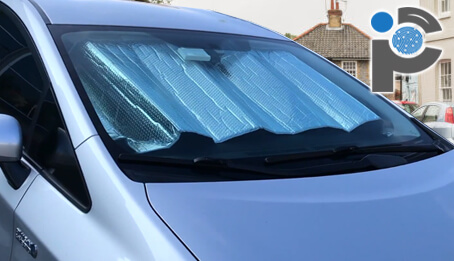
Photo: Reflective sunshades are effective at stopping people from seeing into your vehicle, but are not discreet and tend to stick out.
If sunshades or curtains are being used in the vehicle, then the agent will typically rely on cameras in order to see outside the vehicle and photograph the subject. If a vehicle is fitted with a dash cam, then often the investigator will hook-up an external monitor allowing them to see out. Dash cams which also feature cameras at the rear (or sides) of the vehicle are even better for this purpose and can allow the detective to see all around their vehicle while remaining totally hidden.
In some cases, temporary window film (usually static cling film) can be used to tint a window temporarily and then be removed and reused where needed. Temporary window film is especially useful if the agent is using a rented vehicle and cannot make any permanent modifications to the vehicle.
Related articles
Essential Equipment & Gadgets for Private Investigators
February 19, 2021 - Reading time: 13 minutes
Updated on: August 27, 2025
Private investigation is an area which relies heavily on different gadgets and new forms of technology. As new equipment is constantly being developed and released, competent private detectives should try to familiarize themselves with the latest technology as much as possible. In many cases, having the right tool for the job can make the difference in reaching a successful outcome.
Of course, much depends on the individual preferences and techniques favoured by the particular agent, as well as the environment and circumstances surrounding the case. When it comes to surveillance, we believe that there is not always one correct way of doing things, or one correct piece of gear which should be used. We have however written this article to provide tips and a general guide.
This article will touch on some of the equipment and gadgets which many detectives find essential during their work on surveillance assignments.
1. Mobile phone
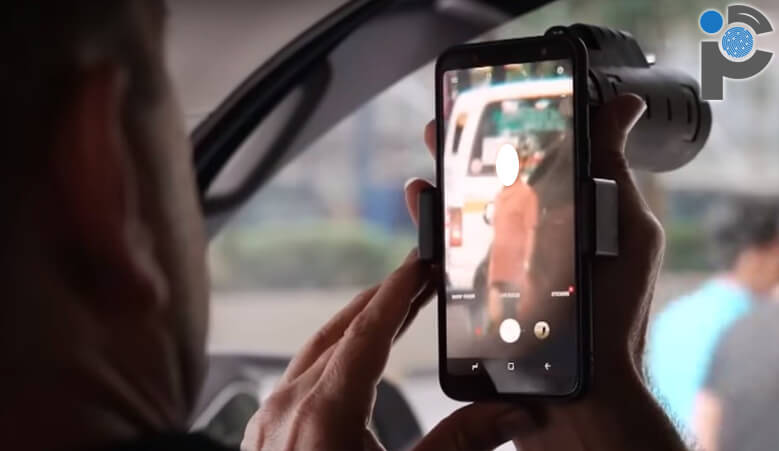
Photo: An Australian federal police investigator uses a mobile phone fitted with a lens attachment to photograph a subject during a surveillance operation.
Mobile phones an essential tool for private detectives. From providing directions to an assignment with GPS navigation, or communicating with clients, or even collecting audio/photo/video in some cases, the mobile phone has an infinite number of different uses during private investigations.
What type of phones do private investigator use?
Although this is really a matter of personal preference, many private investigators favour the latest model iPhone for use at work, others may prefer an Android based device and choose a Samsung device. When a mobile phone is being relied on during assignments, it really pays to have a decent device which is on the higher end of the scale. Having a more powerful processor in your phone, and more RAM, can make a noticeable difference in the amount of time it can take to perform tasks. Higher end phones typically have better cameras and image sensors which can also make a big difference.
Although some firms frown on the use of mobile phones to collect evidence during surveillance cases, the practice is becoming more and more common as camera technology has continued to gradually improve… Although a mobile phone may not be suitable for taking long range photos, if the subject is in a confined space then collecting good photos/videos at short range can be achieved with relative ease. Although it should be noted that having a practiced sleight of hand, and a rehearsed technique of discreetly taking photo/video in this way can make a big difference in the end results.
Mobile phone accessories
- Privacy screen protectors
In cases where surveillance is taking place in a crowded area, using a privacy film on the phone’s screen can be beneficial. Privacy phone screen protectors work by blocking vision of the screen unless it is being viewed from straight on. This means that no-one sitting or standing next to you is able to read messages on your phone or see what is on your phone screen – this is the theory at least. Using a privacy screen protector can be useful when a phone is being used in crowded areas, and with the legal minefield surrounding data protection, protecting your phone screen can be a good idea if you are dealing with private information.
Privacy film protectors work best when the screen brightness is turned as low as possible. In addition to mobile phones, they can also be used on laptops and tablets.
- Power bank
If an assignment has the potential to continue for a prolonged period, then a fully charged power bank may come in useful if there is no other source of power available.
- Tripods & lens attachments
A tripod should be used to stabilize mobile phones when they are being used for photography wherever possible. Although our general consensus is that a dedicated video camera or DSLR would generally produce better results, some detectives do use lens attachments to capture photos using their mobile phones, and the results can be surprisingly good in some cases.
2. Camera

Many private detectives also have a keen interest in photography and may use some very advanced (and expensive) camera setups. Being a photography geek can really help during many investigations. If the subject is very far away, for example, then a telephoto zoom lens which can zoom in on people from literally miles away, would be needed in order to stand any chance at capturing usable images. Having the knowledge to take good photographs during low light conditions, or when the subject is moving, are essential during surveillance cases.
Whatever camera setup you decide to use, having full knowledge of your equipment will be necessary, as well as a rudimentary understanding of photography, at the very least.
What type of cameras do private investigators use?
The answer to this question all comes down to personal preference and the location of the assignment. However, 4K resolution is fast becoming the standard for most new camera equipment. We would recommend a good all-round camera such as the Canon EOS Rebel SL3, which offers 4K and a vari-angle touch screen. The Sony FDR-AX53 4K is another very popular choice for private detectives, due to its Sony's SteadyShot technology which does a good job at keeping videos stable.
When selecting a camera, it would be wise to consider how it will be used and choose an appropriate device. During static surveillance, for example, a popular tactic is to position a camera towards a vehicle or property, and then connect an external monitor to the camera. This allows the agent to keep an eye on the target while remaining out of sight themselves, and is another reason for the Sony FDR-AX53's popularity in detective circles.
In some cases where video is being taken at close range, action cameras such as the GoPro can also be used. Covert body cameras, or "bullet cameras" are slightly more discreet than action cameras and are also favoured by many private detectives.
Surveillance agents will typically collect a variety of cameras or lenses and choose the most appropriate tool for the job in each case.
Covert cameras used by private investigators
Covert, or "hidden" cameras can be concealed in virtually any object or item of clothing, and they come in useful during a wide variety of different cases. A competent detective will often have a covert camera on hand which they can use should the need arise. We typically use covert cameras which are concealed in accessories that can be incorporated into many different outfits.

Photo: Cameras hidden in headwear can be incorporated into many different outfits easily and quickly. This agent is photographed wearing a camera hidden in a baseball cap.
3. Laptop
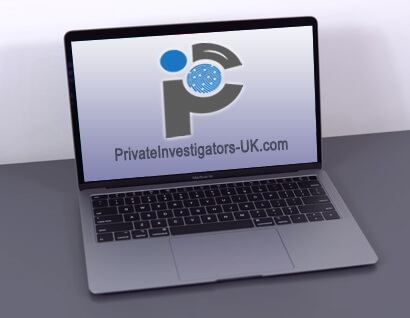
Photo: MacBooks are great pieces of kit, but are they a must have for private detectives?
Laptops are essential pieces of kit for private investigators. From writing reports to e-mailing clients and editing photos or videos, many tasks could not be completed on the fly without a laptop computer.
What type of laptops do private investigators use?
Any laptop with sufficient power can be used during private investigations. Realistically, editing photos or videos will be the most resource heavy activity that a private investigator requires. Many detectives choose to purchase the latest and best Apple MacBooks, however any laptop which is capable of running your chosen editing software without problems (such as Photoshop or Premiere Pro), will suffice in most cases. High-end laptops such as those made by Apple have the advantage of being higher quality and with higher specifications, and are usually worth the investment if you are not constrained by a budget, however, any laptop with enough processing power can be used in most cases.
We recommend upgrading the hard drive in your laptop to an SSD (Solid State Drive) - if your laptop is not already fitted with an SSD, then upgrading from a traditional HDD (Hard Disk Drive) will usually make the laptop run much, much faster; there is also less chance that you will lose data through the drive failing or malfunctioning. If you are using your laptop for any kind of important work, then upgrading the drive would be a wise investment.
Netbooks and tablets, while useful for performing many tasks such as responding to e-mails, are typically not a replacement for laptops. The power and versatility which comes from a laptop cannot be replaced with these devices in most cases, although we have seen cases where agents use high end tablets to manipulate photos/video, most detectives tend to rely on laptops whilst performing their duties.
4. GPS trackers
![]()
GPS tracking devices are being used by private investigators more now than at anytime before, and it's easy to understand why. By using GPS trackers, detectives are able to track the whereabouts of a vehicle or person at anytime, and also plot the past locations on a map. This information can help us to decide which dates and times are best for us to conduct surveillance and collect incriminating photos or video.
GPS trackers are typically very small and can be quickly attached to vehicles in a matter of seconds. Private detectives generally learn the best locations to conceal trackers depending on the type of vehicle - each car has crevices which can be used to conceal a tracking device in a matter of seconds. When our client advises us that they require a GPS tracking device to be installed, we will typically ask them which make/model of vehicle they would like to track. We can then decide the best location for a tracking device; this may also depend on how and where the target vehicle is parked. The battery life of the tracker will depend on which device we are using in your case.
Please read our GPS tracker installation service page for more information on this subject.
5. Provisions
Occasionally we are asked to perform surveillance for a fixed amount of time such as 8 hours, and during this allotted time we might observe something interesting or unexpected - perhaps we have observed the subject incriminating themselves and there are likely to be more opportunities to photograph them if we continue. In some cases our clients will decide that they would like to extend the surveillance for a longer time, and if we are able to accommodate these requests then we will typically do so.
For this reason, we always try to ensure that our agents are prepared for their assignment and possibly even overtime. The provisions that a private detective are likely to need could be anything from fuel for their car, electricity for their camera gear (and/or a battery pack which can be used to recharge camera gear), food/drinks, money, and anything else that they are likely to need.
PrivateInvestigators-UK
If you enjoyed reading this post, check out these related articles:
What Clothes Do Private Investigators Wear?
February 12, 2021 - Reading time: 9 minutes
Updated on: April 30, 2024
Private investigators are often depicted in films and television programs, and if Hollywood movies are anything to go by, then the average private investigator is typically a chain-smoking middle-aged man donning a trench coat. Of course, the reality of any modern detective agency could not be any further from this type of stereotype. However, as many people might never be in a position where they decide to instruct a private detective, they might have little understanding about private investigators and how we operate.
Private investigators are usually required to blend in with their environment; if a private investigator is working in one of London’s business districts then they will need to wear business attire such a suit in order to blend in. For surveillance work in urban or suburban areas, agents will typically wear normal street clothes and try to remain as unnoticeable as possible. If surveillance is taking place in a rural area then perhaps a wax jacket and wellington boots are more appropriate. The key is to blend in and match the surrounding environment, as well as to present a reasonable excuse for the agent to be in the location of the assignment.
If surveillance is taking place in a shopping mall, for example, then the agent will need to look as though they are genuinely shopping – taking steps such as carrying shopping bags can help to make the effect more convincing. On the other side of the coin, if surveillance is taking place in a small village or a rural location, then posing as a dog walker might help the agent to blend in and not look out of place. By dressing appropriating and using suitable props, we can ensure the best likelihood of success in each case.
There are also times when a detective might choose to disguise themselves overtly, rather than covertly, in order to better fit in. From posing as a dog walker, a courier, or workman, there are countless different professional disguises which can be used depending on the circumstances and nature of the assignment. Virtually any occupation or hobby could be used as a cover for a detective conducting surveillance.
If utilizing a disguise is more likely to produce a successful outcome during a surveillance assignment, then it may be a path that is considered by the agent, depending on their preferences and what they think is most likely to produce the best possible outcome.
Typically, a private detective conducting surveillance will aim to blend themselves in with their surroundings as much as possible. The goal is to fit into the crowd and not present any visual features which could make the agent more memorable. The correct attire would all depend on the circumstances and the location of the assignment. Whether or not it would be appropriate to use any form of disguise would also depend on the circumstances and location, as well as the detective’s preferred methods.
In some cases, if a detective is conducting surveillance from the comfort of their vehicle, then it doesn’t really matter what clothes they wear, as they might expect to remain out of sight for the duration of their assignment… Though a competent agent will remain prepared to exit their vehicle if doing so is necessary and likely to benefit the case.
What type of clothes should private investigators not wear?
What type of clothes should private investigators not wear? Bluetooth ear pieces, clothing with camouflage patterns, any type of “tactical” gear such as tactical pants, any clothing which carries insignia linked with law enforcement or military. Suffice it to say that both trench coats and fedoras would be strictly off-limits for any detective that is tasked with conducting surveillance – besides from maybe the occasional fancy dress party.
The goal is to avoid clothing or accessories which hint at your occupation. Even small accessories such as paracord bracelets (which are popular with law enforcement/military) or Bluetooth earpieces can act as subtle clues and should be avoided.

Do private investigators wear suits?
Yes, some private investigators do wear suits during their day-to-day business of meeting with clients, organizing assignments, or writing reports. For court appearances or other formal occasions, a suit would be a likely outfit for a private detective. During a surveillance operation however, it would be wise to wear clothing which is most appropriate for the setting, and this may or may not be a suit depending on the circumstances.
Whether or not a detective wears a suit would be a matter of company policy in most cases. In general however, people that wear suits on a day-to-day basis within a detective agency are more likely to be staff that are tasked with meeting clients face to face or acting as a representative for the company. Agents that are tasked with conducting surveillance generally do not wear suits unless the occasion calls for it… In many cases, formal clothes such as a suit would be more of a hinderance during undercover surveillance work.
Hiding hidden cameras inside clothes
During certain investigations the agent may decide that using a hidden camera could benefit the case. A competent private detective will be able to hide hidden camera equipment inside items of clothing or accessories which could be incorporated into any outfit in their wardrobe.
Modern hidden camera and recording equipment is small and discreet enough to be incorporated into virtually any outfit or style of clothing with relative ease. Private detectives are usually equipped with the best and latest in camera technology, and choosing an outfit capable of concealing camera equipment is never usually an issue.
Changing clothes during surveillance
There are some cases where during surveillance it is beneficial to change items of clothing. Typically, if “on foot” surveillance is taking place for any prolonged period in multiple different locations, then changing items of clothing could help to make the agent less noticeable.
If the subject is being followed on foot through multiple different shops, for example, then some detectives would seek to alter their clothing or appearance to try and ensure that the subject does not remember or notice them. Accessories which obscure the face, such as sunglasses or hats for example, are thought by some to help make their faces less memorable, but these accessories should only be used where they are tasteful and appropriate... Dark sunglasses at night for example, might draw attention to the agent when their aim is to remain unnoticed. The goal is to “not make yourself look like a private investigator”.
Do private investigators wear bullet proof vests?
We should make clear that information which is published by PrivateInvestigators-UK obviously relates to the United Kingdom only. For a private investigator working in the UK, there should be no need for them to wear a bullet proof vest or a stab proof vest while conducting surveillance assignments. During surveillance the objective is to collect evidence in the form of images/video while remaining unnoticed by the subject… If an agent feels that they are likely to become noticed and potentially attacked whilst conducting surveillance, then frankly they are not doing their job properly.
Surveillance assignments, when conducted properly and by trained agents with the right experience, have a very low risk of going wrong or resulting in an outcome where violence is used towards the investigator. However, if that same investigator is also involved with work such as close protection (security, or even process serving in some cases), then they might decide that wearing protective clothing such as a bullet/stab proof vest would be a good idea. This would be a matter of personal preference or company policy in some cases.
What type of cars do private investigators drive?
Just as private investigators typically wear clothes which blend into their environment, detectives usually take the same approach with vehicles. Surveillance vehicles can be either covert civilian vehicles, or in some cases they might be more overt and adopt the method of hiding in plain sight. If you are interested in the subject of surveillance vehicles, then read our blog post What type of cars do private investigators drive? for a more comprehensive answer to this question.
PrivateInvestigators-UK are a leading detective agency serving all areas of the UK and beyond. Please read our homepage for more information about us and the different services that we offer.
Related articles
If you enjoyed this blog post, then check out these other related articles:
What Type of Cars do Private Investigators Drive?
February 9, 2021 - Reading time: 11 minutes
Updated on: July 23, 2025
This article has been written by PrivateInvestigators-UK, and relates to cars used by private investigators in the UK (England, Wales, Scotland and NI). If you are not based in the UK, then the answer to this question will of course depend on your local environment.
Private investigators should drive cars which are suited to the type of environment they are working in. A late model or high-end vehicle will match its environment best in an affluent area, for example. Whereas in rural areas a muddy land rover might be less conspicuous, in urban areas surveillance agents tend to choose vehicles which are comfortable for working long hours, but that are also as discreet as possible.
Of course, the answer to this question also depends on whether the surveillance will be static (watching a property and photographing anyone coming and going), or mobile surveillance where the agent is seeking to follow the subject and find out where they are going.
What types of vehicle are used by private investigators?
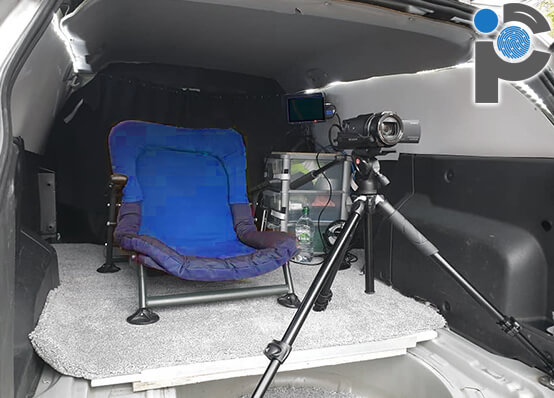
Small car-derived vans are popular in the UK which make them a good choice as surveillance vehicles – without having any seats in the rear of the vehicle there is space for an agent to setup camera equipment and go about his or her work. Transit vans of all sizes are also very common on British roads and are often used by private investigators; they can provide a lot of space to setup equipment and make a comfortable space for a detective to work. Estate cars are also popular with surveillance agents, especially if the seats can be removed or folded flat so that the rear of the vehicle can accommodate a camera and tripod setup.
However, private detectives can use almost any type of vehicle that is properly setup for surveillance. SUVs or crossovers are also popular, we have also seen many examples where small and compact cars were used for surveillance. Cars which have easily removed seats and tinted windows can be used effectively in many cases.
We cannot condemn any specific type of surveillance vehicle, as we have seen countless ingenious setups and uses of virtually every type of vehicle for surveillance that you can imagine… All it takes is some thought and creativity as to how the specific vehicle can be best used in each individual case.
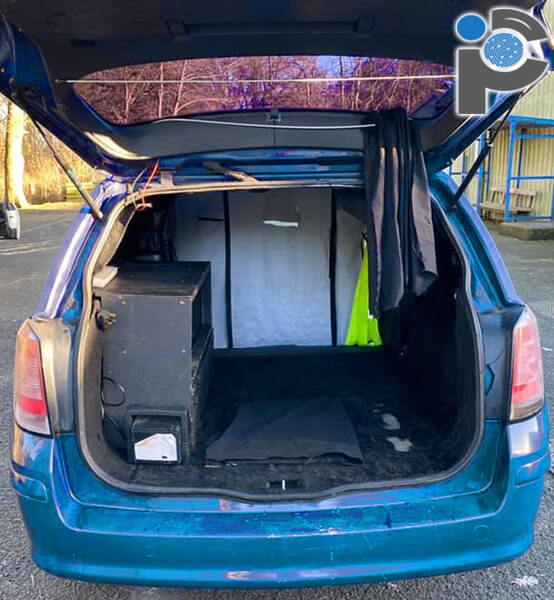
Vehicle signage used by private investigators
In the case that a detective is using a car-derived van or a transit van for surveillance, they may choose to add fake business signage to their vehicle to make it seem less conspicuous. If you choose to take this path then we would recommend purchasing magnetic signs, so that your signage can easily be removed or changed depending on the location of the assignment.
The key with using dummy signage is to match the environment where the vehicle is being used. For example, there is no reason for a TV aerial company to be parked at the bottom of a dirt track or in a field for days on end… Dummy signage can actually make your vehicle more conspicuous if done badly.
The key is to purchase professional signs which match your type of vehicle (make/model/year), and to match your environment. For example, if construction is taking place within a certain area, then it would not seem suspicious for a builder’s van to be parked in the area for many days or even weeks.
If a van is being used by a construction company, for example, then you would expect to find dirty high-vis jackets, hard hats, and muddy work boots in the cab of the truck.
Keeping your surveillance vehicle low-key
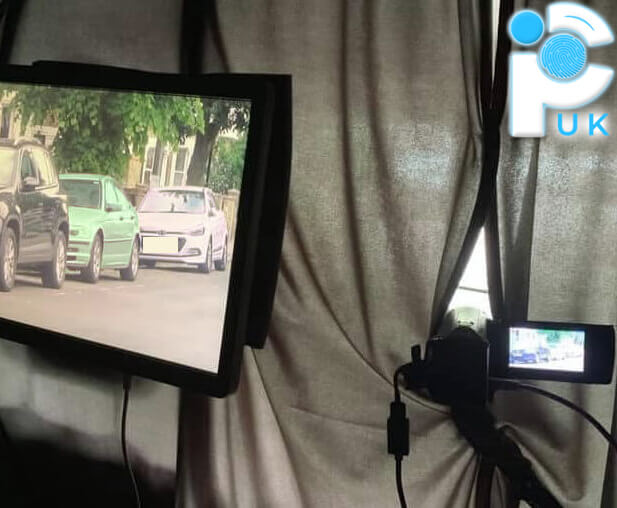
Whether you are using a car, van, or truck, it would be wise to choose a common, nondistinctive vehicle. Cars which are silver or white in colour are favoured by many detectives. If you have a bright pink car or a vehicle wrapped in metallic gold then you really ought to consider purchasing a different vehicle, or getting the one that you have repainted.
Customising your vehicle with chrome accessories, a body kit, loud exhaust, private number plate, or indeed anything which will make it stand out would be a definite no-no for cars which are being used during surveillance cases. The goal is to make your vehicle as benign and ordinary as possible – modifying a vehicle in ways which make it stand out is not a good idea.
Renting vehicles for private investigation
In the event that a case requires the use of many different vehicles, it is not uncommon for private investigators to rent vehicles, particularly if they are working for a small firm and do not have the resources to maintain a fleet of different vehicles which can be used for surveillance. Whether the cost of renting a vehicle would be included as part of the investigation or billed separately would be a matter for the detective agency; though suffice it to say that any additional charges will need to be explained and made clear to the clients in each case.
Using window tint for private investigations
Vehicles which are being used by private investigators to conduct surveillance are very often fitted with dark window tint (usually 5% “limo tint”). Window film can be fitted professionally or at home with relative ease. UK law prevents dark window film from being applied to the front windscreen of a vehicle and the driver and passenger side windows. Rear windows in your car can be tinted to any level or even covered with curtains.
Particularly if a rented vehicle is being used for surveillance, then static cling window film can be used temporarily, which can be applied to the window and then removed and reused as necessary.
Window tint does have limitations and it’s important to understand them when using a vehicle for surveillance. If the amount of light outside your vehicle is greater than the amount of light inside, then the effect of the film will be reversed. A camera or laptop screen will be visible through dark window film at night, for example, and could easily blow your cover during surveillance. Blackout curtains would typically be used to help solve this problem at night.
Window film can be difficult to see out of at night, depending on the amount of ambient light in the area outside your vehicle. Ceramic window film, while costing slightly more, generally provides better night-time visibility and greater heat reflectivity than standard window films.
The essentials for any surveillance vehicle
Surveillance vehicles can be setup with very little effort; or with a huge amount of effort with external cameras placed around the vehicle and a battery system able to power them. At the very least surveillance vehicles should have a tripod for stabilising any camera equipment that is being used and any provisions the agent will need during the course of the assignment.
There is no single correct method when it comes to setting up a vehicle for use in surveillance during private investigations. How a vehicle is setup, and the tactics that are used, will typically vary depending on the circumstances in each case and the aims of our client.
Power inside your surveillance vehicle
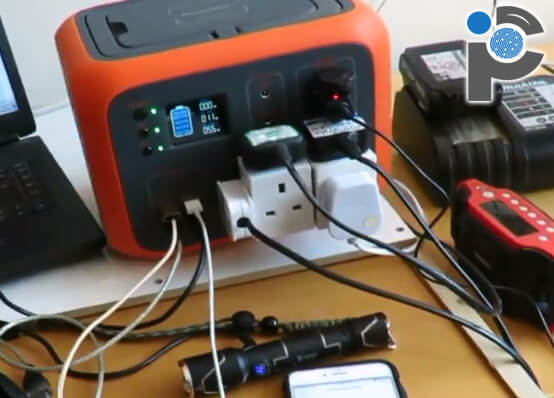
Using a vehicle for surveillance will always consume some form of power, whether that is a simple DSLR or video camera, a computer, or a more elaborate setup with multiple different cameras. In summertime it is often necessary to keep cool by running fans. Solar panel and battery setups are popular for people that are using commercial vehicles (such as transit vans), on smaller vehicles however solar panels mounted on the roof may create unwanted attention.
Idling a diesel or petrol engine for any length of time during surveillance would be off-limits during the vast majority of investigations. Rechargeable battery packs can be used in some cases where solar is not viable; as technology continues to evolve, there are many battery packs on the market which are capable of powering equipment for the length of an assignment.
Many electric and hybrid electric vehicles are able to supply power to your electronics without needing to run a noisy petrol or diesel motor. Electric vehicles can also allow you to run your air conditioner, which would make a huge difference to comfort levels on particularly cold or hot days. We are seeing more investigators choose electric or hybrid vehicles, partially for their usefulness to power camera gear and other electronics.
Dash cams for private investigators
Dash cams are becoming more essential for motorists in general, as well as private investigators. Their main benefit is the ability for video to be captured hands-free while the agent drives their vehicle; dash cams are generally not relied on to capture evidence, though they can come in handy from time to time.
We would recommend purchasing a good quality dash cam, which preferably records in 4K or at least 1080p. While some people power their dash cams using their car cigarette lighters, they can also be professionally wired into the vehicle’s fuse box, which can allow the dash cam to record 24 hours per day, even when the vehicle ignition is switched off.
We also highly recommend installing a rear facing camera externally on your vehicle so that video is captured from the rear. Camera setups with 4+ cameras are becoming more common as technology improves and becomes cheaper. If your vehicle is being used for surveillance then choosing a dash cam which is discreet and cannot be easily noticed from outside the vehicle would be a good idea.
As with all equipment and gadgets, we believe that you get what you pay for with dash cams, and that spending money for a higher quality device is almost always a wise decision.
PrivateInvestigators-UK
If you enjoyed this blog post, then check out our other related articles:
You are reading the PrivateInvestigators-UK blog — home to the UK's leading detective agency. Learn more about us by visiting our homepage PrivateInvestigators-UK.com.